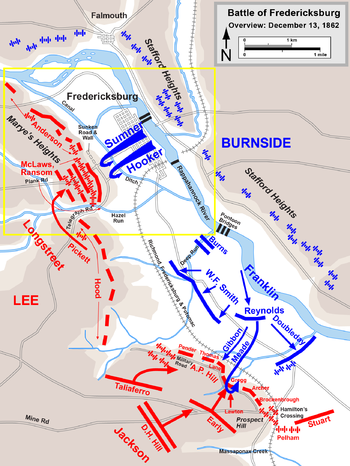“It can hardly be in human nature for men to show more valor or generals to manifest less judgment, than were perceptible on our side that day.”
Cincinnati Commercial in a report on the battle of Fredericksburg
Fredericksburg I think is the absolute nadir of Union fortunes in the Civil War. After the sacking of McClellan, Major General Ambrose Burnside came up with a plan that wasn’t bad. Burnside would take the Confederates by surprise by crossing the Rappahannock River at Fredericksburg and then racing the Army of Northern Virgnia to Richmond. Burnside arrived opposite Fredericksburg on November 17 and he had stolen a March on Lee. Unbelievably the pontoon bridges were nowhere to be found, bungling of an almost preternatural nature being responsible for not placing them at the front of the Union advance. Burnside sat on the river across from Fredericksburg for almost a month while Lee fortified the heights outside Fredericksburg. The key for the success of the plan, surprise, had vanished. Lee was present and in an immensely strong position. It made absolutely no sense for Burnside now to cross at Fredericksburg and initiate a battle and yet that is what he did.
The Union army crossed the river on December 11-12, under heavy fire from Confederate sharpshooters, with some street fighting in Fredericksburg.
The attacks against the Confederate fortified positions outside of Fredericksburg occurred on December 13. Burnside had divided his army into three Grand Divisions. The Center Grand Division south of Fredericksburg had 60,000 men in two corps : Major General John Reynolds I Corps and W.F. Smith’s VI Corp. Instead of ordering an attack by the entire Grand Division, Burnside only order an attack by one division. Franklin assigned this task to Reynolds who choose Meade’s 4500 division to make the attack, supported by Gibbon’s division. Meade and Gibbon were facing Jackson with some 35,000 men. Fortuitously Meade’s assault attacked a section of the Confederate line that had been accidentally left unmanned, and Meade made a breakthrough. Confederate reserves quickly chased Meade and Gibbon back to the Union lines. A Confederate counterattack suffered heavy casualties from the fresh troops of the rest of the Grand Division supported by Sickles’ III Corps. Most of the Confederate casualties at Fredericksburg were from this abortive counterattack.
Directly west of Fredericksburg was Maryre’s Heights, where Longstreet’s corp occupied the strongest position on the battlefield. Between 11:00 AM and dusk seven union divisions attacked one after the other, often attacking a brigade at a time. None of the attacks made headway and all were repelled with heavy losses. At Maryre’s Heights some 8000 Union casualties were sustained as opposed to 1200 Confederates. No attempt was made by Burnside to coordinate the attacks, although it probably made little difference. In response to a message from Lee during the battle inquiring if he needed reinforcements Longstreet responded that he needed none and stated “General, if you put every man on the other side of the Potomac on that field to approach me over the same line, and give me plenty of ammunition, I will kill them all before they reach my line.” Historian Shelby Foote was sometimes accused of a Southern bias, but he said that the bravest act in the War was the continual charges of the Union troops when it must have been clear to the veterans among them that it was hopeless.
The sky was lit up that evening by an unusual manifestation of the Aurora Borealis is the southern skies. Confederate troops said that Heaven was celebrating the victory of the South. In despair Burnside ordered yet new assaults for th 14th and planned to lead them himself. He was talked out of it by aides. No fighting occurred on the 14th and the Army of the Potomac crossed the Rappahannock in retreat on the 15th. Union casualties were over 12,000, Confederate casualties less than half that number.
Publicly Lincoln kept up a brave face to this disaster. He wrote to Burnside on December 22 after Burnside, rightfully, shouldered all the blame for the defeat:
Executive Mansion, Washington December 22, 1862.
To the Army of the Potomac:
I have just read your commanding general’s report of the battle of Fredericksburg. Although you were not successful, the attempt was not an error, nor the failure other than accident. The courage with which you, in an open field, maintained the contest against an intrenched foe, and the consummate skill and success with which you crossed and recrossed the river, in the face of the enemy, show that you possess all the qualities of a great army, which will yet give victory to the cause of the country and of popular government.
Condoling with the mourners for the dead, and sympathizing with the severely wounded, I congratulate you that the number of both is comparatively so small.
I tender to you, officers and soldiers, the thanks of the nation.
A. Lincoln.
Privately Lincoln said that if there were a worse place than Hell he was in it. Within a month Lincoln would replace Burnside after his abortive Mud March, the subject of a future post, with Major General “Fighting Joe” (he hated the nickname) Joseph Hooker.


